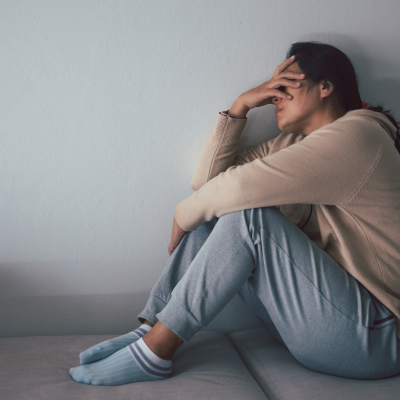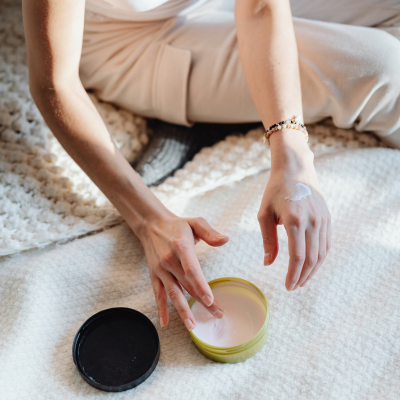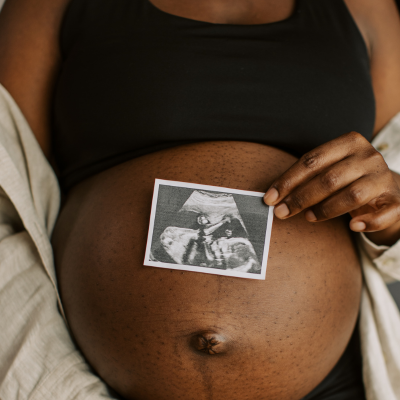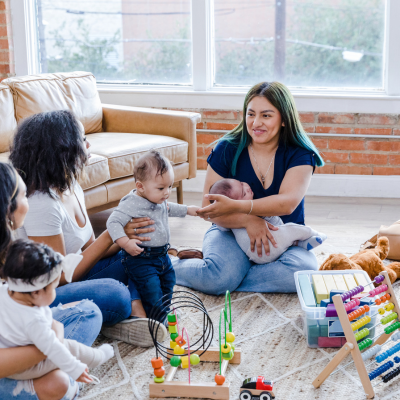You’re allowed to change your vision of what your family will look like. There’s no right or wrong.
You had a bad experience with postpartum depression or anxiety and now you’re wondering what’s next. Do you have another baby? Do you risk dealing with a mood disorder again? Is it valid to wonder about not continuing to build your family? Are you “allowed” to feel nervous or not that excited about this next pregnancy?
This is actually one of the most commonly asked questions that I get from the community. Postpartum depression (PPD) and postpartum anxiety (PPA) are serious issues that women deal with and they can have a severe impact on how one experiences the earliest chapters of motherhood.

For some, the effects are relatively minor and they don’t question the idea of getting pregnant again. For others, the symptoms are enough to make them question (or even deter them entirely from) having another child.
There’s no right or wrong response or way to feel. Let’s make sure that’s clear right from the get-go. Because there’s so much shame, secrecy, questioning, or even women wondering if their reactions are valid, I want to explore this topic to answer everything you might hesitate to ask.
What does severe PPD or PPA feel like?
Mood disorders that hit in the postpartum period include anxiety, depression, OCD, bipolar, or psychosis. The more severe cases of any of these mean that the person who is suffering experiences significant disruptions in their day to day life. They may self-harm, think about suicide, wonder if their baby and family would be better off without them, and they might also regret their decision to become a mom. It’s also possible to become physically sick or just generally not well enough to function. For those with anxiety, the fears about safety, uncertainty, and constantly feeling on edge can be debilitating.
Even though perinatal mood disorders are somewhat common (about 20% for anxiety and depression), it can feel startling for the person who is experiencing this. (Remember that there’s a difference between common and normal. It’s not normal to be wanting to self-harm or be contemplating suicide and if that’s what your experience is like, there’s always help.)
Feeling surprised or blind-sided by your experience may make you question if you want to risk going through it again. That makes sense, and is totally understandable!
How likely is it that I’ll develop a mood disorder again?
If only it were possible to know whether or not you would have a repeat experience with postpartum depression or anxiety, I wish we could know this. But there’s no way to guarantee that your experience with your next child will be easier. There’s also no way to guarantee that you’ll 100% develop PPD or PPA again.
It’s always helpful to get as much information as possible though (knowledge is power). And predicting whether or not you might experience mental health issues again isn’t a total toss up. A lot of therapists, counsellors, pregnant people, and people in the perinatal world do pay attention to factors that put a woman at risk of PPA and PPD.
Having a personal history with perinatal mood disorders already does increase your risk. Other factors to pay attention to include: relationship trauma, abuse, or instability; having dealt with stressful life events recently; inadequate support; family history of mental health issues; birth trauma, and others.
But this shouldn’t be all doom and gloom. Having depression or anxiety during the postpartum phase may just be one small difficult chapter in an otherwise incredible journey and relationship with your child.
And it’s not wrong, irresponsible, or in any way a bad idea to expand your family just because you’ve experienced postpartum depression or anxiety. You can take control, learn coping tactics and build a support plan so that you and your family are taken care of. Read more about how to set yourself up for success here.
Deciding whether or not to have another child: Costs versus benefits
Postpartum depression and anxiety look different for everyone and so the way these disorders impact your life moving forward will also be unique to your own experience.
Having experienced severe PPD or PPA won’t necessarily mean that a person will decide against having a subsequent child, for example. In the same vein, maybe a parent’s experience wasn’t “severe” but it was enough for her to not want to go through it again. Which is totally valid.
There’s absolutely no right or wrong here. You’re the expert of your own story and you get to call the shots. You’re allowed to change your mind and you’re allowed to pick a route different from the one you originally planned.
Sometimes though, coming to a decision can be incredibly difficult. What I encourage people to think about is the cost versus the benefit. What is the cost of having another baby knowing that there’s a higher chance you could experience a mood disorder again? How would that weigh on you and your family?
On the flip side, what if you didn’t have another child… what might be the cost of that choice? And how does that version of your story sit with you?
These questions are not easy to answer so it’s entirely understandable if you can’t clearly define the cost versus the benefit right away.
For some, maybe a big family was a major dream forever and so the cost of not having more kids would be bigger than the cost of dealing with postpartum mental health challenges again. Another parent might acknowledge that they wanted another child (or assumed they would have one) but they’re just not up for a repeat experience. It’s okay to change or question a vision. You hold the deciding power here!
Reflection questions:
Deciding whether or not to get pregnant again after having an experience with a postpartum mood disorder is one of the bigger decisions you’ll ever make. Sure, even that thought alone can feel like a lot of pressure and in turn, bring on a wave of anxiety. Understandable.
That’s why I created a list of questions that can help you get closer to your values. I hope these can help you get clear on what you want your family and your future to look like—whether you need to revisit these questions once, twice, or several times.
- Looking at your past experience, what feels tolerable, meaning, what do you think you could handle again? What doesn’t feel tolerable? (And what first came to mind when you asked yourself that?)
- What was the hardest part of your postpartum depression/anxiety experience?
- What was the impact for you, your relationship with your partner, and your family?
- Were there factors that played a role in you developing a mood disorder (or made it worse)?
- If you were to feel this way again, what would you do differently?
- What would you tell a best friend if she were in this exact same situation? Would you encourage her or dissuade her?
- If you could go back in time, what would you tell your past self? Is there anything you’d want her to know?
- What supports do you think could make a difference the next time around and are those available? (I.e. Could things realistically look different next time?)
- Are you prepared to ask for help? (From friends, family, support groups, a therapist, nanny, etc.)
- Get outside of the current situation for a second and imagine your life 5, 10, and 20 years from now. When you picture your entire life—and the version of you at those stages—does that shift anything either way for you?
Having a hard time envisioning what you want the future for your family to look like? Deciding whether or not to have another baby is hard. So is dealing with the postpartum depression, anxiety or other mood disorders that arise during the postpartum period. If you want support with family planning decisions, or you need to arrange a solid support system before the birth of your next baby, I have a team of therapists in Canada who do exactly that. The Perinatal Collective supports moms and moms to be on all the difficult things that arise during parenthood. Learn more here. Outside of Canada? Checkout Postpartum Support International for Their Therapist Directory.








Comments +